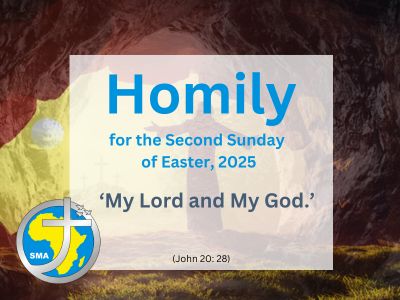Readings: Acts 5:12-16; Revelation 1:9-13,17-19; John 20:19 – 31
Theme: ‘My Lord and My God’ (John 20: 28)
By Michael McCabe
Today’s gospel reading from John recounts three distinct but related events: a) on the evening of first day of the week (Sunday) the appearance of the Risen Jesus to his disciples locked behind closed doors ‘for fear of the Jews’; b) Jesus’ commissioning of his disciples to continue his mission of forgiveness and peace; and c), eight days later, Jesus’ second appearance to his disciples, this time in the company of Thomas, who is brought to believe that Jesus is truly risen by touching the wounds in his risen body. The reading climaxes in Thomas’ great acclamation of faith: ‘My Lord and my God’ (Jn 20:28).
The natural thing to do when we feel anxious or threatened is to withdraw to a safe place, lock the doors, and wait until the danger passes. That is precisely what the disciples of Jesus did following the capture, torture and horrific death of their master. Despite having been told by Mary Magdalene that she had seen the Risen Lord and having heard the message he asked her to tell them, they remain paralysed by their fear, sense of failure, and perhaps guilt that they had not stood by their master. It is in such a confused state that the now Risen Jesus comes to them, not with words of blame or recrimination, but with his peace. His first words are ‘Peace be with you’ (Jn 20:19).
The significance of this greeting is underlined by being repeated three times in this short passage. We usually think of peace as the absence of conflict and turmoil, the ending of all those things that make us anxious and fearful. However, the peace Jesus offers is something more profound than the ending of conflict or the resolution of difficulties. The peace Jesus gives us is not the kind of peace the world around us can offer, not the often illusory security that comes from having wealth or power. Earlier in John’s Gospel, Jesus says to his disciples: ‘My peace I leave with you; my peace I give to you. I do not give to you as the world gives. Do not let your hearts be troubled, and do not let them be afraid’ (Jn 14:27). The peace of Jesus not something that we can create from our own resources, but something that can only be received as a gift ‘from above’.
Having freed his disciples from the prison of their own making by his gift of peace, the Risen Jesus, immediately commissions them to continue his mission of peace and forgiveness. For this, he empowers them with the gift of the Spirit. ‘As the Father sent me, so am I sending you. After saying this he breathed on them and said: “Receive the Holy Spirit. For those whose sins you forgive, they are forgiven; for those whose sins you retain, they are retained’ (Jn 20:21-23). As the Risen Jesus came to his disciples, so he comes to us today in the midst of our fears, doubts, pain and confusion. He comes bringing us his peace and breathing into our anxious hearts the empowering breath of the Spirit, embolding us to continue his healing mission of peace and forgiveness.
John tells us that the apostle, Thomas, was not with the group of disciples when Jesus first appeared, but he doesn’t tell us why. Perhaps socially distancing himself from the rest of the apostles was his way of dealing with his grief at what had happened his master. However, Thomas is with them the following Sunday when Jesus again appears to his disciples, openly manifesting in his Risen body the scars of his traumatic recent history. It is surely significant that Jesus does not hide his wounds but invites the ‘doubting’ Thomas to touch them and to ‘doubt no longer but believe’ (Jn 20:27).
The scarred body of our risen Lord is the ultimate sign of divine empathy. The glorified Christ identifies himself with those whose experiences of pain, loss, trauma, and horror leave scars that never fade. The wounds of our Risen Lord remind us that he knows, understands, and is with us in our pain. The poet Edward Shillito, who witnessed the horrors of World War I, found comfort in the ‘Jesus of the Scars’, who knew what it was like to suffer in human flesh.
The heavens frighten us; they are too calm;
In all the universe we have no place.
Our wounds are hurting us; where is the balm?
Lord Jesus, by Thy Scars, we claim Thy grace.
Aware of the terrible wounds that afflict both the world and the Church today. Jesus invites us, as he invited Thomas, not to recoil in fear, but to bury our doubts, fears and confusion in the wounds of his risen body. As the prophet Isaiah teaches us: ‘By his wounds we are healed’ (Is 54:5). It was Thomas’ response to Jesus’ invitation to touch his wounds (cf. Jn 20:27) that drew from him the greatest act of faith in the Bible: ‘My Lord and my God’ (Jn 20:28).On this Divine Mercy Sunday, in these difficult and confusing times, we pray that we will find our solace, hope, and courage in the wounded, risen Christ.
Listen to an alternative audio by Tom Casey:

